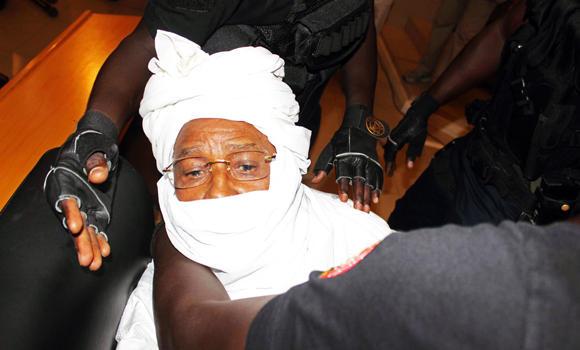More than a quarter-century after his blood-soaked reign came to an end, former Chadian dictator Hissene Habre went on trial in a Senegalese court on Monday in what is seen as a test case for African justice.
Once dubbed “Africa’s Pinochet,” the 72-year-old has been in custody in Senegal since his arrest in June 2013 at the home he shared in an affluent Dakar suburb with his wife and children.
Dressed in white robes and a turban, Habre pumped a fist in the air and cried “God is greatest” as he was escorted by prison guards into the Extraordinary African Chambers in the Senegalese capital.
Habre had said he did not recognize the court’s jurisdiction and vowed he and his lawyers would play no part in the trial.
But guards forced him into the dock before a courtroom packed with a thousand participants and spectactors.
Judge Gberdao Gustave Kam of Burkina Faso opened proceedings and announced that the erstwhile military strongman had no legal representation.
Supporters screamed out slogans hailing Habre as a “liberator” of Chad before they were removed by police.
Habre — backed during his presidency by France and the United States as a bulwark against Libya’s Muammar Qaddafi — is on trial for crimes against humanity, war crimes and torture in Chad from 1982 to 1990.
He was overthrown by rebel troops in December 1990 and fled to Senegal.
Chief prosecutor Mbacke Fall paid tribute to the survivors of the Habre era “who had the virtue to pursue the fight against impunity.”
Rights groups say 40,000 Chadians were killed under a regime propped up by crackdowns on opponents and the targeting of rival ethnic groups Habre perceived as a threat to his grip on the Sahel nation.
Delayed for years by Senegal, the trial sets a historic precedent as until now African leaders accused of atrocities have been tried in international courts. Senegal and the African Union signed an agreement in December 2012 to set up a court to bring Habre to justice.
FRENCH VERSION
Une fois surnommé “Pinochet de l’Afrique”, les 72 ans est en détention au Sénégal depuis sonarrestation en juin 2013 à la maison qu’il partageaitdans une banlieue cossue de Dakar avec sa femmeet ses enfants.
Vêtus de robes blanches et un turban, Habre pompéun poing en l’air et s’écria « Dieu est plus grand »comme il a été escorté par des gardiens dans leschambres extraordinaires africaine dans la capitalesénégalaise.
Habré avait dit qu’il ne reconnaissait pas lacompétence de la Cour et a promis de que lui et sesavocats ne jouerait aucun rôle dans le procès.
Mais des gardes qui oblige dans le dock avant unesalle d’audience remplie de mille participants etbouleversent.
Juge Gberdao Gustave Kam du Burkina Faso aentamé des poursuites et a annoncé que l’ancienstrongman militaire n’avait aucune représentationlégale.
Habre — soutenu durant sa présidence par la Franceet les Etats-Unis comme un rempart contre laMuammar Qaddafi Libye — est jugé pour crimescontre l’humanité, crimes de guerre et torture auTchad de 1982 à 1990.
Il a été renversé en décembre 1990 par les troupesrebelles et ont fui vers le Sénégal.
Les groupes de droits dire que 40 000 Tchadiens ont été tués dans un régime soutenu par la répressiondes opposants et le ciblage des groupes ethniquesrivaux que Habre perçue comme une menace pourson emprise sur le pays du Sahel.
Retardée pendant des années par le Sénégal, leprocès établit un précédent historique que jusqu’à ce que les dirigeants africains maintenant accusésd’atrocités ont été jugés par un tribunalinternational. Sénégal et l’Union africaine ont signéun accord en décembre 2012, de mettre en place untribunal pour traduire Habré en justice.


